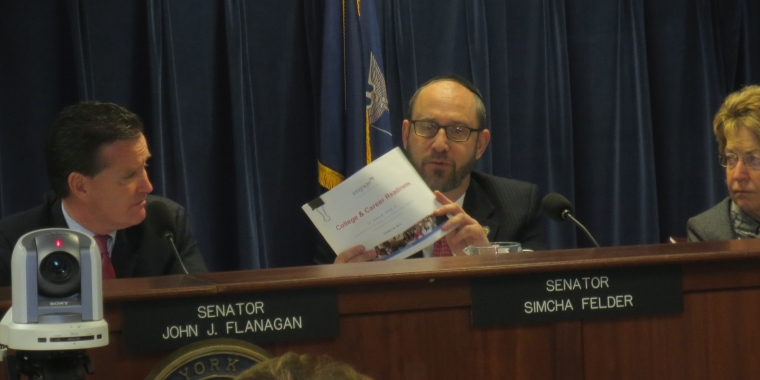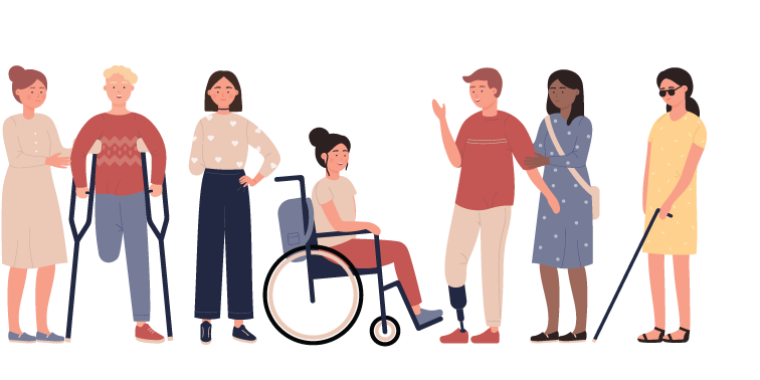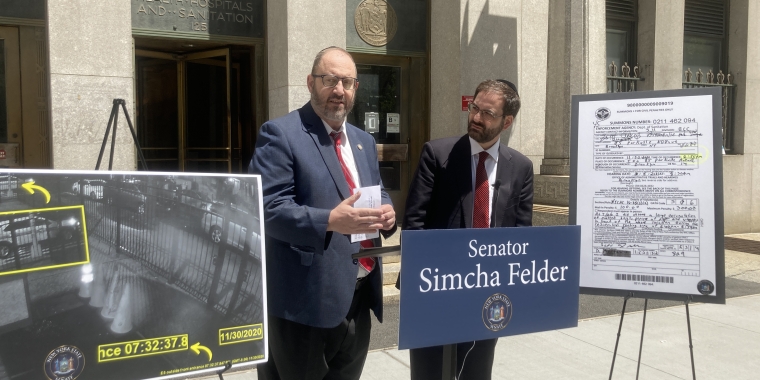Senators Felder & Flanagan Host Education Hearing in New York City
Simcha Felder
October 31, 2013
-
ISSUE:
- Education
-
COMMITTEE:
- New York City Education

FELDER TO STATE BOARD OF REGENTS CHANCELLOR TISCH: MORE MUST BE DONE TO HELP LEARNING DISABLED STUDENTS SUCCEED
Senator Simcha Felder (D-Brooklyn), Chairman of the New York City Education Subcommittee, and Senator John Flanagan (2nd Senate District), Chairman of the New York State Senate Standing Committee on Education, convened an education hearing in New York City this week to review the impact and effectiveness of recent state education reforms. The “Regents Reform Agenda: ‘Assessing’ Our Progress” is the fourth of five Senate Education Committee hearings being held throughout the state.
Early on in the hearing, Senator Felder received applause from the standing-room only audience for his comments to Chancellor Tisch, telling her that children are not robots and that something has to be done to address the needs of the thousands of children who will never prove proficient under the new Common Core Standards.
“I find it quite disturbing and offensive that the testing and evaluations that we’ve talked about – Common Core and beyond – really have not discussed at all children that will never, ever be proficient in all the tests that we’re giving,” Senator Felder told the Chancellor. “That is not in any way to diminish the significance of having tests and trying to make sure our kids do the best we can. But. . . the fact is that there are many children that will excel in other vocations without being super-duper in the English language, math or anything like that. . . there’s no discussion at all about preparing those kids.”
Senator Felder continued, “The discussion about Common Core is an important one and the question about teacher training is a problem. . .but how in the world can we talk about measuring proficiency in children if the only discussion revolves around how they’re going to do in college when we know that there’s an entire population of kids – kids are not robots and neither are the teachers – there’s a significant portion of that population that are not going to go to college and may never be at the level of proficiency they can be. They will be artists, they will be musicians, they will plumbers, electricians and everything else that the State needs.”
In response, the Chancellor said she, like Senator Felder, understands that children develop and learn differently and that the State supports “multiple pathways to graduation” including an expansion of career, arts, and technical opportunities. “Children can get to graduation in a variety of ways,” Chancellor Tisch said. “Working out the adult politics to get there is proving to be very complicated.” The Chancellor said talks about a proposed expansion will resume in January.
The main focus of these hearings has been to review reforms embarked upon in 2010 by the New York State Board of Regents known as the Regents Reform Agenda. This agenda was designed to prepare students for college and 21st century careers, close the achievement gap, and instill a lifelong love of learning in children. As these reforms are implemented by the Board of Regents, questions and concerns continue to be raised about the impact these changes will have on students throughout New York State. The topics of Tuesday’s hearing included state assessments, New York’s implementation of the Common Core Standards, and the protection of student privacy.
In the nearly all-day hearing, Senators Felder and Flanagan heard testimony from and questioned State and City education officials; the Council of School Administrators; UFT President Michael Mulgrew; learning specialists; concerned parents; education and privacy advocates; as well as, learning disability experts. Senators Golden, Martens, Little, Stavisky, Tkaczyk, and Hoylman also participated in the hearing.
The Senate Education Committee will be convening one more hearing as part of the series in Albany on November 13.
Share this Article or Press Release
Newsroom
Go to NewsroomThe Holocaust Education New York Needs
June 4, 2021



